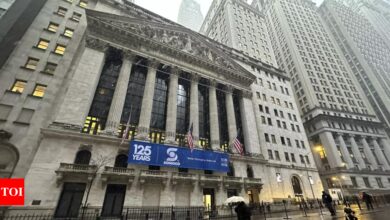Business
Sensex, Nifty decline for third consecutive session

[ad_1]
NEW DELHI: Both Indian indices – sensex and Nifty – continued their decline for the third consecutive session on Thursday, primarily driven by fears of a more hawkish stance of the US Federal Reserve.
The BSE benchmark sensex fell by 570 points to close at 66230. The Nifty suffered a decline of 159 points to end at 19742.
Both indices have experienced a decline of roughly 2% over the course of the week, contrasting with their 2% gains and all-time highs in the previous week.
The Federal Reserve’s decision to maintain key interest rates, along with upward revisions in economic projections coupled with inflation concerns, caught the market by surprise.
The information technology (IT) sector led the losses, with a decline of approximately 1%. Notable IT firms like HCL Tech and Tata Consultancy Services were among the top losers on the Nifty benchmark, with declines of 2% and 1.8%, respectively. Most Indian IT companies generate a significant portion of their revenues from the United States.
The mid-cap index, which is more domestically focused, traded flat, while small-caps experienced a 0.2% decline.
Here are main reasons why markets are on a downward trend:
Hawkish Fed
On Wednesday, the US Federal Reserve made the decision to maintain its current interest rates while adopting a more hawkish stance. In contrast to their previous projections, they now anticipate another rate hike by the end of this year and plan to maintain a significantly tighter monetary policy through 2024.
Similar to their outlook in June, the median among Fed policymakers still envisions the central bank’s benchmark overnight interest rate peaking within the range of 5.5-5.75% this year, which is only a quarter percentage point above the current range. They also project that the federal funds rate will reach 5.1% by the close of 2024 and 3.9% by the end of 2025.
“The market was not expecting the pause to be longer and interest rates to remain high,” Aishvarya Dadheech, chief investment officer at Fident Asset Management, told Reuters. “So at these valuations, because of this (Fed) event, a broad-based sell-off (in India stocks) can’t be ruled out,” he added.
Bond yields
The yield on two-year US Treasury notes surged to its highest level in 17 years at 5.1970%, while the 10-year yield reached 4.4310%, marking a new peak in 16 years. Increasing bond yields have a detrimental effect on stock prices, with the Nasdaq closing 1.5% lower. Asian markets, including Japan and China, also saw declines of over 1% in their trading.
Higher oil prices
Contributing to the inflationary concerns, there is a notable increase in crude oil prices. Experts are forecasting the possibility of oil prices reaching the $100 per barrel threshold in the near future.
According to experts, every $10 rise in crude oil prices increases India’s current account deficit by 0.5%.
Inflation fears
The rise in crude prices has a cascading impact on inflation. According to reports, a 10 percent rise in crude oil prices is projected to result in an approximately 0.9 percent increase in India’s Wholesale Price Index (WPI).
Selling by FIIs
Foreign Institutional Investors (FIIs) offloaded equities worth Rs 3,110.69 crore on Wednesday, according to exchange data.
(With inputs from agencies)
The BSE benchmark sensex fell by 570 points to close at 66230. The Nifty suffered a decline of 159 points to end at 19742.
Both indices have experienced a decline of roughly 2% over the course of the week, contrasting with their 2% gains and all-time highs in the previous week.
The Federal Reserve’s decision to maintain key interest rates, along with upward revisions in economic projections coupled with inflation concerns, caught the market by surprise.
The information technology (IT) sector led the losses, with a decline of approximately 1%. Notable IT firms like HCL Tech and Tata Consultancy Services were among the top losers on the Nifty benchmark, with declines of 2% and 1.8%, respectively. Most Indian IT companies generate a significant portion of their revenues from the United States.
The mid-cap index, which is more domestically focused, traded flat, while small-caps experienced a 0.2% decline.
Here are main reasons why markets are on a downward trend:
Hawkish Fed
On Wednesday, the US Federal Reserve made the decision to maintain its current interest rates while adopting a more hawkish stance. In contrast to their previous projections, they now anticipate another rate hike by the end of this year and plan to maintain a significantly tighter monetary policy through 2024.
Similar to their outlook in June, the median among Fed policymakers still envisions the central bank’s benchmark overnight interest rate peaking within the range of 5.5-5.75% this year, which is only a quarter percentage point above the current range. They also project that the federal funds rate will reach 5.1% by the close of 2024 and 3.9% by the end of 2025.
“The market was not expecting the pause to be longer and interest rates to remain high,” Aishvarya Dadheech, chief investment officer at Fident Asset Management, told Reuters. “So at these valuations, because of this (Fed) event, a broad-based sell-off (in India stocks) can’t be ruled out,” he added.
Bond yields
The yield on two-year US Treasury notes surged to its highest level in 17 years at 5.1970%, while the 10-year yield reached 4.4310%, marking a new peak in 16 years. Increasing bond yields have a detrimental effect on stock prices, with the Nasdaq closing 1.5% lower. Asian markets, including Japan and China, also saw declines of over 1% in their trading.
Higher oil prices
Contributing to the inflationary concerns, there is a notable increase in crude oil prices. Experts are forecasting the possibility of oil prices reaching the $100 per barrel threshold in the near future.
According to experts, every $10 rise in crude oil prices increases India’s current account deficit by 0.5%.
Inflation fears
The rise in crude prices has a cascading impact on inflation. According to reports, a 10 percent rise in crude oil prices is projected to result in an approximately 0.9 percent increase in India’s Wholesale Price Index (WPI).
Selling by FIIs
Foreign Institutional Investors (FIIs) offloaded equities worth Rs 3,110.69 crore on Wednesday, according to exchange data.
(With inputs from agencies)
#Sensex #Nifty #decline #consecutive #session





